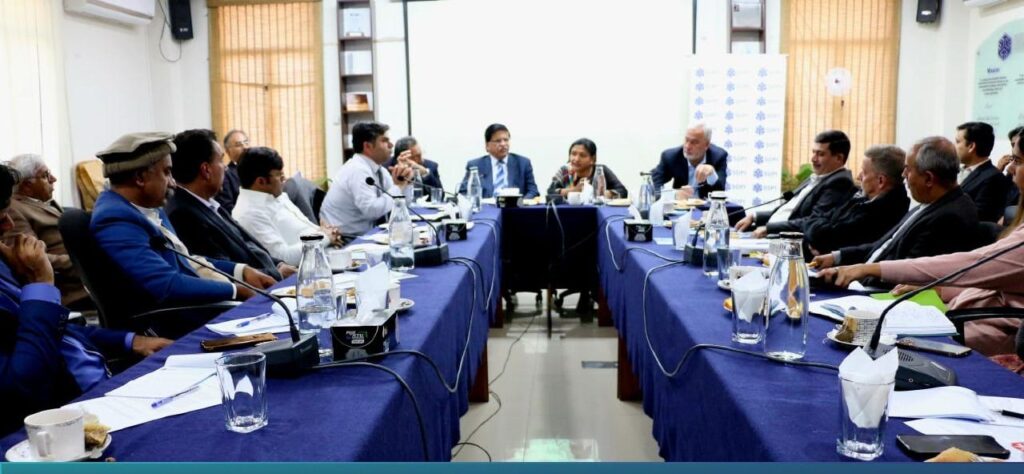
ISLAMABAD : Experts at a high-level roundtable called the government and policy makers to come up with an inclusive and holistic approach to meet the exacerbating climate crisis through anticipatory adaptation.
The roundtable titled “Foresight and futures thinking for Anticipatory Adaptation in Pakistan” was organized by the Sustainable Development Policy Institute (SDPI) in collaboration with the International Centre for Integrated Mountain Development (ICIMOD) to address how various stakeholders are thinking of future risks, and how these risks could be integrated into existing plans and policies.
In his opening remarks, Dr Babar Shahbaz, Faculty of Social Sciences, Institute of Agricultural Extension Education and Rural Development, set the ground for the participants to deliberate on pertinent and relevant issues precisely. To become future-fit, he said, it is important to understand future risks and take anticipatory actions.
Amina Maharjan, Senior Specialist Livelihoods and Migration, ICIMOD briefed the participants on the foresight and futures thinking for anticipatory adaptation in the region, methods to explore future pathway in terms of foresight, scenario development, development of efficient strategies and understanding foresight beyond predictions.
She briefed the participants on the emerging concept of foresight as the method of scoping, sensitization, participatory scenario development, integration into plans and policies and gender inclusive steps to address data gaps, and other shortcomings hampering climate resilient future development through a futuristic approach.
Sultan Mehmood, the World Food Programme (WFP) representative, mentioned the climate adaptation related interventions being implemented through the WFP collaboration particularly the Living Indus Initiative. He underscored the need to address water management, governance, land cover area protection and multi-hazard vulnerability risk assessment (MHVRA) as crucial components to successfully meet the challenge of climate foresight.
Muhammad Farooq, Senior Joint Secretary, Ministry of Climate Change and Environmental Coordination, briefed the roundtable about the steps taken by the Ministry in the aftermath of rising magnitude of climate catastrophes. He shed light on the development of the baseline data based on modern techniques, MHVRA being done for high resolution data work underway on climate on mapping and prediction by 2090.
Mr Farooq also pointed out lacunas in existing strategies particularly no linkage between adaptation and NDCs which has been done by developed countries. Pakistan has submitted its National Adaptation Plan to UNFCCC and is the 40th country do it. Moreover, adaptation cells have been created at the Ministries including climate change, planning and at the provincial ministries. Pakistan is losing 8% of its GDP due to climate recurring catastrophes and it has crossed the tipping point of climate crisis and entered into a new normal, he added.
Dr Shafqat Munir, Deputy Executive Director, SDPI informed the forum that amid discourse on anticipatory approaches, it is required to have systems capable to workout disaster risk reduction and climate change anticipatory adaptation and foresight models.
He said the stakeholders and partners are working in silos that needs to end, whereas risk governance and financing need to be looked with anticipatory approach.
United Nations Environment Programme representative Arshad Samad Khan presented a brief view of climate vulnerability of the region and mentioned glacial melt in the north and sea level rise at the coasts in the south among the major climate crises faced by the country. He maintained that the lack of awareness at community level was the problem that needed to be addressed at the priority.
Obaidur Rehman Zia from SDPI proposed the roundtable to shift from deterministic to probabilistic approach.
Shameen Raza, UNDP-Pakistan briefed the forum about the success of GLOF project that significantly reduced losses of human lives and infrastructure in the glacial lake outburst flood prone areas. She mentioned that it was a promising intervention because of its localized nature and approach.
Representative from the PARC briefed the roundtable that there was need to review the hotspots of the country facing water shortage crisis and those regions’ contribution to the GDP through their agriculture output also needed to be studied for better strategies.
He added that there was a need to learn and adopt new information and technology related to climate science and mitigation.
Representative from the Zarai Taraqiati Bank noted that there are green climate finance solutions but farmers are mostly unaware of such initiatives. He demanded of the quarters concerned to share the most modern research and such scientific solutions in lucid and clear language.
Dr Farrukh Rashid from Pakistan Meteorological Department (PMD) informed the participants about the measures taken by the PMD for strengthening it’s hydro meteorological infrastructure across the country.
He suggested addressing the demographic issues of countries like Pakistan in the region that were having bulging sizes of population churning up most of the natural resources which was unsustainable.